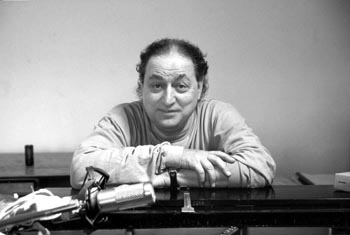![[MetroActive Books]](/gifs/books468.gif)
![[MetroActive Books]](/gifs/books468.gif)
[ Books Index | Sonoma County Independent | MetroActive Central | Archives ]
Note Worthy
In tune: Allaudin Mathieu's new work compares differences in cultural hearing.
West meets East in musical theory
By Bruce Robinson
FOR THE LAST 400 years, one half of the world has been hearing music quite differently from the other. The microtones and multipitched scales of Arabic and Indian music include many notes that simply cannot be produced by keyboard instruments and sound quite foreign and often "wrong" to Western ears.
But the two are fundamentally the same, says Sebastopol composer, teacher, and author Allaudin Mathieu in his new book, Harmonic Experience: Tonal Harmony from Its Natural Origins to Its Modern Expression (Inner Traditions; $45).
"This book is new because it reconciles two heretofore opposing views of music, basically the old and the new," Mathieu explains. "The old being 'just intonation'--the harmonic sounds and tunings of people's music, folk music, ancient music--and the new being Western music, keyboard music, and the tempered scale.
"G-sharp is not the same as A-flat," says Mathieu, using his voice to demonstrate the small but distinctly audible difference. At the piano, however, both notes are represented by a single black key. This is tempered tuning, in which the 30 separate notes are represented by just 12 keys on the piano.
How? "You do it with mirrors," he laughs, likening the effect to aural puns or optical illusions for the ears. "None of the notes are in tune, but you have a huge area open to you."
This development changed an entire culture. "Equal temperament was a dramatic occurrence in the history of music," Mathieu says. "It caused the Western ear, which adopted it, to hear in an expansive, evolutionary way. But it also allowed it to forget what it once knew, which was the pure resonances of just intonations."
Using nearly 1,000 musical illustrations and graphics, Harmonic Experience reaches back to the basic Pythagorean physics of sound and relative pitch, exploring the interrelationship between harmony and the overtone sequence.
Despite its strong theoretical foundation, Mathieu believes that Harmonic Experience is a book that only a musician could have written. "Whatever success I've had with this lies with the fact that I am basically a composer," he says. "I ask questions that enable me to become a deeper and more expressive composer. So the questions tend to be real questions that are rooted in sound and its expression."
This is Mathieu's third book, following The Listening Book and A Musical Life, two engaging collections of musings and short essays on the ways we perceive sound and music, and the ways they affect us. Although he grew up in a publishing household--his father founded Writer's Digest and several other magazines--Mathieu concentrated strictly on music until he chanced to meet Coleman Barks, whose eloquent translations of Rumi have reawakened Western appreciation to that Sufi poet.
"His joy of language was so extreme and infectious that I caught it," Mathieu recalls. "I realized that I had discovered something about the way that music behaves and the way we live inside it that had not yet been articulated in the culture. And it was very helpful to my creative process and to the progress of my students. I realized that God would not let me die in peace until I wrote this down."
[ Sonoma County Independent | MetroActive Central | Archives ]
Copyright © Metro Publishing Inc. Maintained by Boulevards New Media.

Michael Amsler
From the Sept. 11-17, 1997 issue of the Sonoma County Independent.